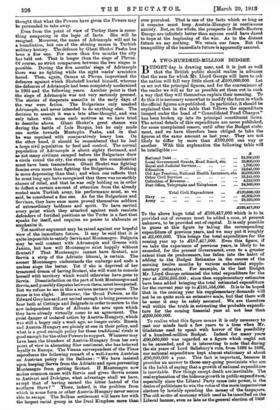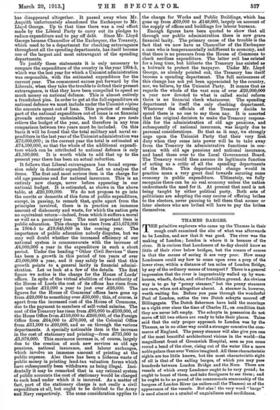A TWO-HUNDRED-MILLION BUDGET. B ITDGET day is drawing near, and it
is just as well that the British public should realize in advance that the sum for which Mr. Lloyd George will have to ask the nation will fall very little short of £200,000,000. Let us set out the principal figures, and for the convenience of the reader we will as far as possible set them out in such a way that they will themselves explain their meaning. To do this it is necessary somewhat to modify the form in which the official figures are published. In particular, it should be explained that in the table that follows the expenditure lumped under the head of "Consolidated Fund Charges" has been broken up into its principal constituent items. The actual details of this expenditure are never published, for some unexplained reason, until after the Budget state- ment, and we have therefore been obliged to take the figures at the same amount as last year. They are not likely to differ by more than £100,000 one way or
another. With this explanation the following table will be intelligible :—
National Debt ... 24,600,000 Local Government Grants, Road Board, etc. ... 10,800,000 Royal and Judicial Services ... 1,700,000 Education ... 19,645,000 Old Age Pensions, National Health Insurance, etc. 20,099,000 Other Civil Services ... 15,245,009 Collection of Revenue... ... 4,633,000 Post Office, Telegraphs and Telephones ... 24,366,000 Total Civil Expenditure £120,888,000 ... 46,309,000
Army ... ••• ... 28,220,000 £195,417,000 To the above huge total of X195,417,000 which is to bE. provided out of revenue must be added a sum, at present unknown, to be provided out of capital. It is only possible to guess at this figure by taking the corresponding expenditure of previous years, and we may put it roughly at £2,000,000. This brings the total expenditure for the coming year up to £197,417,000. Even this figure, if we take the experience of previous years, is likely to be exceeded, for the present Government, even to a greater extent than its predecessors, has fallen into the habit of adding to the Budget Estimates in the course of the ensuing twelve months by various substantial supple- ruentary estimates. For example, in the last Budget Mr. Lloyd George estimated the total expenditure for the year at £186,885,000; since then supplementary estimates have been added bringing the total estimated expenditure for the current year up to X191,556,000. It is t,o be hoped that in the coming year his supplementary demands will not be on quite such an extensive scale, but that there will be some it may be safely assumed. We are therefore well within the truth in estimating the probable expendi- ture for the coming financial year at not less than £200,000,000.
To realize what this figure means it is only necessary to cast our minds back a few years to a time when Mr. Gladstone used to speak with horror of the possibility of a hundred-million Budget. Indeed for many years £90,000,000 was regarded as a figure which ought not to be exceeded, and it is interesting to note that during the six years of Lord Salisbury's rule, from 1886 to 1892, our national expenditure kept almost stationary at about £90,000,000 a year. This fact is important, because it provides an answer to those easy-going pessimists who are in the habit of saying that a growth of national expenditure is inevitable. Few things except death are inevitable. The real explanation of the hideous growth in public expenditure, especially since the Liberal Party cam. into power, is the desire of politicians to win the votes of the more impecunious electors by lavishly spending the money of the taxpayers. The old motto of economy which used to be inscribed on the Liberal banner, even as late as the general election of 1906 has disappeare,d altogether. It passed away when Mr. Asquith unfortunately abandoned the Exchequer to Mr. Lloyd George. Up to that time there was a real effort made by the Liberal Party to carry out its pledges to reduce expenditure and to pay off debt. Since Mr. Lloyd George became Chancellor of the Exchequer, the Treasury, which used to be a department for checking extravagance throughout all the spending departments, has itself become one of the largest and most extravagant of the spending departments. To justify these statements it is only necessary to compare the expenditure of the country in the year 1904-5, -which was the last year for which a Unionist administration was responsible, with the estimated expenditure for the current year. The commonest excuse put forward by the Liberals, when they take the trouble to defend their present extravagance, is that they have been compelled to spend so much money on national defence. This is almost entirely a fraudulent plea. In order to get at the full expenditure on national defence we must include under the Unionist regime the amounts spent out of loan. This practice of meeting part of the national expenditure out of loans is on financial grounds extremely undesirable, but it does pro tanto relieve the budget of the year, and therefore in any true comparison between two years must be included. On this basis it will be found that the total military and naval ex- penditure in the last year of the Unionist administration was £73,000,000; in the current year the total is estimated at £74,500,000, so that the whole of the additional expendi- ture which can be attributed to national defence is only £1,500,000. It is worth while to add that up to the present year there has been an actual reduction.
It follows that Liberal extravagance has found expres- sion solely in domestic expenditure. Let us analyse the items. The first and most serious item is the charge for old age pensions and for national insurance. This is an entirely new charge, never before appearing in our national budget. It is estimated, as shown in the above table, at £20,100,000. We do not propose to go into the merits or demerits of this form of public expenditure, except, in passing, to remark that, quite apart from the principles involved, there is in practice an immense amount of dishonesty and waste, for which the nation gets no equivalent return—indeed, from which it suffers a, moral as well as a pecuniary loss. The next important item is public education. This charge has risen from £15,672,000 in 1904-5 to £19,645,000 in the coming year. The importance of public education nobody disputes, but we may well doubt whether the increased efficiency of our national system is commensurate with the increase of £4,000,000 a year in the expenditure in such a short period. Under the heading "Other Civil Services" there has been a growth in this period of ten years of over £3,000,000 a year, and it may safely be said that this growth points to a general laxity in financial admini- stration. Let us look at a few of the details. The first figure we notice is the charge for the House of Lords' offices. In spite of the virtual abolition of the authority of the House of Lords the cost of its offices has risen from just under £12,000 a year to just over £28,000. The figures for the House of Commons' offices have gone up from £29,000 to something over £50,000; this, of course, is apart from the increased cost of the House of Commons, due to the payment to members of self-voted salaries. The cost of the Treasury has risen from £93,000 to £109,000, of the Home Office from £159,000 to £268,000, of the Foreign Office from .264,000 to £70,000, of the Colonial Office from £51,000 to £60,000, and so on through the various departments. A specially noticeable item is the increase in the cost of stationery and printing—from £731,000 to £1,078,000. This enormous increase is, of course, largely due to the creation of such new services as old age pensions, national insurance, and labour exchanges, which involve an immense amount of printing at the public expense. Also there has been a hideous waste of public money in printing land-tax valuation forms which have subsequently been withdrawn as being illegal. Inci- dentally it may be remarked that in any rational system of public accounts the cost of stationery would be charged to each head under which it is incurred. As a matter of fact, part of the stationery charge is not really a civil expenditure at all, but ought to be debited to the Army and Navy respectively. The same consideration applies to the charge for Works and Public Buildings, which has gone up from £69,000 to .2149,000, largely on account of the supply of offices and buildings for labour bureaux. Enough figures have been quoted to show that all through our public administration there is now grave financial laxity. The primary cause of the trouble is the fact that we now have as Chancellor of the Exchequer a man who is temperamentally indifferent to economy, and that there is no pressure from the House of Commons to check needless expenditure. The latter evil has existed for a long time, but hitherto the Treasury has existed as a bulwark to protect the taxpayer. Under Mr. Lloyd George, as already pointed out, the Treasury has itself become a spending department. The full seriousness of this change has not yet been appreciated by the country, nor, we believe, by the Unionist Party. It means that as regards the whole of the vast sum of over £20,000,000 a year now devoted to what is called social reform there is no financial check whatsoever. The spending department is itself the only checking department. Whatever the officials of the Treasury decide to spend there is no one to say them nay. It is asserted that the original decision to make the Treasury respons- ible for the administration of old age pensions, and subsequently of national insurance, was largely due to personal considerations. Be that as it may, we strongly urge upon the Unionist Party that their very first duty when they come into power will be to take away from the Treasury its administrative functions in con- nexion with old age pensions and national insurance, and hand these over to the Local Government Board. The Treasury would then assume its legitimate function of acting as a critic of all the spending departments of the State. This departmental change would in practice mean a very great deal towards securing some economy in public expenditure. Ultimately, we fully recognize there can be no real economy unless the nation understands the need for it. At present that need is not being taught by either political party. Both sets of politicians are adopting the easy course of offering bribes to the electors, never pausing to tell them that sooner or later electors who are bribed will have to pay the bribes themselves.











































 Previous page
Previous page